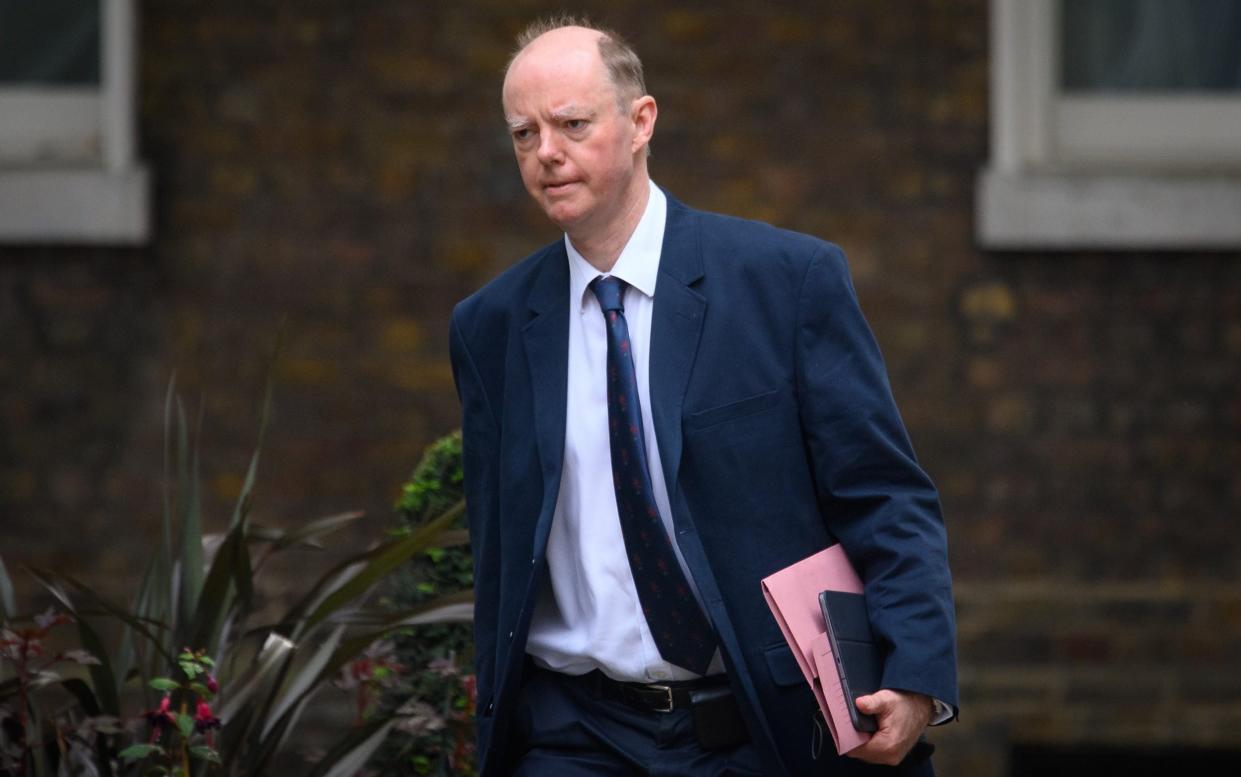Roadmap out of lockdown in doubt as Chris Whitty warns UK is nearing limits of what can be reopened safely

The return of schools and spectator sport was cast into doubt on Friday after the Government’s chief medical adviser indicated the country had reached the limit of what could be reopened safely.
With Boris Johnson slamming the brakes on and postponing Saturday’s reopening of venues such as bowling alleys, theatres and casinos, the roadmap for easing outstanding lockdown measures now looks uncertain.
Speaking alongside the Prime Minister at the Downing Street press conference, Professor Chris Whitty also suggested that the UK may have to “pull back” further to keep the virus under control.
Asked if schools could still reopen in September as planned, he told reporters: "I think what we're seeing from the data from ONS and other data is that we have probably reached near the limit or the limits of what we can do in terms of opening up society.
"So what that means potentially is that if we wish to do more things in the future, we may have to do less of some other things.
"And these will be difficult trade-offs, some of which will be decisions for the Government and some of which are for all of us as citizens to do.
"But we have to be realistic about this. The idea that we can open up everything and keep the virus under control is clearly wrong.
“We are at the outer edge of what we can do and therefore choices are going to be made.”
However, Professor Whitty said he agreed with Mr Johnson that reopening schools was a “national priority”, suggesting that the trade-offs are likely to result in other easements being reversed or delayed further.
They include the resumption of spectator sport and business conferences, which are provisionally pencilled in for October 1.
While the Government announced on July 17 that pilots would be launched to determine whether stadia and conference venues could be reopened with social distancing, the decision to cancel these suggests delay could now be inevitable.
This likely to have a knock-on effect on Mr Johnson’s ambition to hold a review of all remaining lockdown measures in November.
Government sources have previously suggested that spectator sport would be a key litmus test for determining whether a complete cessation of social distancing rules could be done safely.
On Wednesday, the Culture Secretary Oliver Dowden also sparked hopes that theatres and indoor music venues may be able to return to full capacity in time for Christmas.
But the last-minute decision to postpone the resumption of indoor performances today [Saturday] - even with socially distanced audiences - suggests this timeframe could now be unrealistic.
Speaking to The Daily Telegraph earlier this week, Government insiders suggested that theatres were a second order priority to Mr Johnson’s central aim of reopening schools.
Some industry leaders have privately pushed for theatres to reopen their doors fully as early as September.
However, a Whitehall source said the return of all pupils would use up too many points from the so-called “R bank” - a calculation used by ministers and officials to determine the impact that individual easements have on the national infection rate.
A Cabinet minister added: “What’s more important? The education of children. It’s everything. Parents are really worried about the effect on their kids and they expect schools to be back - it’s an essential service.
“The return of schools is the number one priority in September and if that means other things can’t happen, then I’m sorry, but the kids come first.”
Prof Whitty also suggested that the Government may have already gone too far in easing lockdown measures, telling reporters “we may have to pull back a bit to keep this under control.”
"If we do pull back then we should be able to hold the line, and if we do not pull back and we start having further interactions, then we can expect to see an increase in cases with all the consequences that go with that,” he added.
His comments, and the reference to potential trade-offs for “all civilians”, suggest that ministers could be forced to re-implement more draconian measures on social interactions.
These measures have already been implemented across the North West, where as many as four million people have now been banned from meeting other households at home and in their gardens.
The latest local lockdown measures also extend to pubs, restaurants, cafes and shops, where customers are now required to stick within their household unit.
Defending the decision to pause the roadmap, Mr Johnson told the press conference: "I've said throughout the pandemic that there would be fresh outbreaks.
"I think from May I said - when we set out our plan - I said we would not hesitate to put on the brakes at the slightest sign the numbers we're going in the wrong direction.
"We're now seeing a warning light on the dashboard, it is right to respond in the way that we are."

 Yahoo News
Yahoo News 
